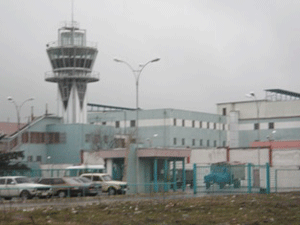“Abolishment of Commissions Was Big Mistake”
Shorena Kakabadze, Kutaisi
 Overcrowded cells, poor medical service, inmates tortured by various diseases and several facts of suicide - these are problems that are often spoken about in regard with Kutaisi Prison N 2.
Overcrowded cells, poor medical service, inmates tortured by various diseases and several facts of suicide - these are problems that are often spoken about in regard with Kutaisi Prison N 2.
The living conditions are still urgent in the prison as it was soon after it was opened.
“If we had problems only about living conditions, we would not have complained. In addition to that, prison personnel are very rude to inmates; I think they do not consider prisoners as humans and treat them like animals. You will not imagine what is happening there. How can you know because nobody speaks about it? How long can it last? The prisoners are afraid. My husband asks me not to complain because he will be punished in prison and maybe even murdered,” said wife of one of the prisoners who prefers to keep her name anonymous.
Former chairperson of the Public Monitoring Commission of the Kutaisi Prison N 2 Manana Managadze spoke about the situation in prison. She assesses the abolishment of the public commissions as a big mistake of the government and connects current unbearable conditions in prisons with this fact.
On December 21, 2007, the public monitoring commissions had their term expired (they were elected for two years). After that, the new election of commissions was to be held but soon it was reported that commissions had their functions ceased. However, the monitoring process lasted before December of 2008.
“The aim of the commissions was to mediate between the prisoners and prison personnel. Monitoring commissions did much positive in this field. After the famous riot on March 27 2006 in Ortachala prison (Tbilisi) the situation got very complicated and tense. The trust between inmates and prison administration was minimal. With our effort the situation changed for better. People did not do anything bad because the commission was monitoring detention settigns. At least, everybody was careful and it was very important. We assisted both sides – prisoners and the administration – to subdue the aggression. None of them can deny this fact. We had close relationship with prisoners. When they were placed in prisons where monitoring commissions did not work, inmates called me and told the situation was completely different there,” said Manana Managadze.
The Penitentiary Department and Ministry of Justice were discussing how to resume the activities of the monitoring commissions for more than a year.
“They proposed us to cooperate with the Public Defender’s office. In December of 2008 when the commissions had their term finally expired, instead resuming their activities nobody mentioned this problem. At least, nobody got in touch with us. Prison Reform International, which had greatly contributed into the successful activities of the commissions, was too eager to continue the function of the commissions. This organization trained the members of the commission and in fact turned them into experts,” said Manana Managadze.
Managadze explained that the government abolished the commissions after they made loud statements about the situation in detention settings.
“We visited the prisons and met prisoners almost every day during three years. Nobody knows what is going there better than I do. I am sure the situation is much worse today because there is nobody who will speak about the situation in prisons. Nobody will be surprised if I say that neither attorneys are very sincere while speaking about the conditions in prisons. They prefer to keep silence about problems and in doing so they support prison administrations, penitentiary department and the government,” said Manana Managadze.
Public Defender of Georgia also has focused on the living conditions in the detention settings (among them Kutaisi prison) and reasons of mortality among inmates in his reports. “Patients’ medical records and analysis of the reasons of their death exposed that prisoners mostly die because of insufficient medical treatment and negligence of the prison administration and doctors. The state does not control the healthcare system in the penitentiary system,” states one of the reports of Sozar Subari.
The Human Rights Center continues to study the situation and concrete facts in Kutaisi Prison N 2 and we will provide you with additional information in near future.



